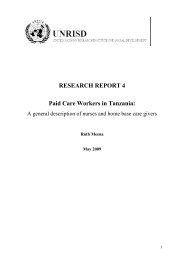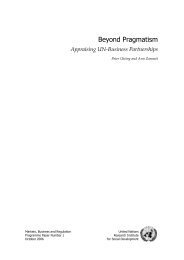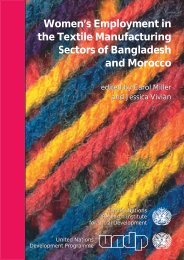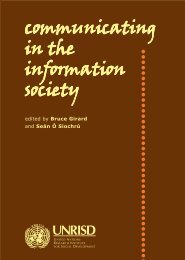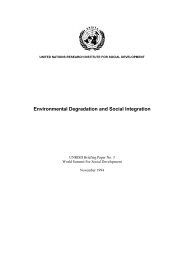The Politics of Gender and Reconstruction in Afghanistan
The Politics of Gender and Reconstruction in Afghanistan
The Politics of Gender and Reconstruction in Afghanistan
Create successful ePaper yourself
Turn your PDF publications into a flip-book with our unique Google optimized e-Paper software.
STATE-BUILDING IN AFGHANISTAN: A TROUBLED TRAJECTORY<br />
to <strong>in</strong>troduce a new press (his <strong>in</strong>fluential bi-weekly newspaper Siraj al-Akhbar appeared from 1911 to 1919).<br />
Like other contemporary Muslim reformers <strong>and</strong> modernists, Tarzi supported the cause <strong>of</strong> women’s advancement<br />
<strong>and</strong> education because the welfare <strong>of</strong> future generations, <strong>and</strong> by extension the welfare <strong>of</strong> the Muslim<br />
community, depended on enlightened wives <strong>and</strong> mothers <strong>and</strong> their moral <strong>in</strong>fluence on youth. Tarzi <strong>and</strong> his<br />
followers also took it upon themselves to <strong>in</strong>terpret religious texts <strong>in</strong> progressive ways, sett<strong>in</strong>g up a tension<br />
between the new <strong>in</strong>telligentsia <strong>and</strong> the clergy.<br />
A key turn<strong>in</strong>g po<strong>in</strong>t came <strong>in</strong> 1919 with the accession to the throne <strong>of</strong> Abdurrahman Khan’s gr<strong>and</strong>son, K<strong>in</strong>g<br />
Amanullah, who was deeply <strong>in</strong>fluenced by “Young Afghan” ideology. By the late 1920s, <strong>Afghanistan</strong> had one<br />
<strong>of</strong> the most progressive bodies <strong>of</strong> legislation <strong>in</strong> the Muslim world, <strong>in</strong>clud<strong>in</strong>g a family law passed <strong>in</strong> 1921<br />
bann<strong>in</strong>g child marriage, free<strong>in</strong>g widows from the dom<strong>in</strong>ation <strong>of</strong> their husb<strong>and</strong>s’ families, requir<strong>in</strong>g judicial permission<br />
before a man could take multiple wives <strong>and</strong> remov<strong>in</strong>g some family law questions from the jurisdiction<br />
<strong>of</strong> the mullahs (Muslim clerics). His wife, Queen Soraya, opened the first girls’ school <strong>in</strong> Kabul <strong>and</strong> education was<br />
made compulsory for all Afghans. <strong>The</strong>se reforms, however, had little effect beyond elite groups <strong>in</strong> Kabul, <strong>and</strong><br />
quickly gave way to a backlash from the ulama <strong>and</strong> tribal groups. <strong>The</strong> overthrow <strong>of</strong> K<strong>in</strong>g Amanullah <strong>in</strong> a tribal<br />
<strong>in</strong>surrection led by Bacha Saqqao <strong>in</strong> November 1928 resulted <strong>in</strong> the total abolition <strong>of</strong> all progressive legislation<br />
<strong>and</strong> measures affect<strong>in</strong>g women. Polygamy laws were re<strong>in</strong>stated, all modern schools were closed, female<br />
students abroad were recalled, libraries, laboratories, palaces <strong>and</strong> the royal museum <strong>in</strong> Kabul were ransacked <strong>and</strong><br />
books burned. Although this government was short lived, it took almost 30 years for the strictures placed on<br />
women to relax.<br />
<strong>The</strong> compromises Nadir Shah, cous<strong>in</strong> <strong>of</strong> K<strong>in</strong>g Amanullah, had to make to consolidate his rule after he quelled<br />
the <strong>in</strong>surrection are deeply significant. He made great concessions to the religious hierarchy, guarantee<strong>in</strong>g<br />
the complete autonomy <strong>of</strong> shari’a courts. By grant<strong>in</strong>g the ulama broad powers but reserv<strong>in</strong>g for the monarchy<br />
the right <strong>of</strong> f<strong>in</strong>al appeal, Nadir Shah made a deliberate though <strong>in</strong>direct attempt to use the powers <strong>of</strong> the religious<br />
establishment to extend the jurisdiction <strong>of</strong> the monarchy over the tribal territories (Gregorian 1969:305).<br />
Among the casualties <strong>of</strong> these compromises were women’s rights. A major concession was made to anti-<br />
Amanullah forces <strong>in</strong> the 1931 constitution (which was <strong>in</strong> force until 1964), which omitted any mention <strong>of</strong><br />
women or their rights.<br />
Nadir Shah’s son, Zahir Shah, put more progressive policies back on track by reopen<strong>in</strong>g girls’ schools <strong>and</strong> declar<strong>in</strong>g<br />
Kabul University co-educational. <strong>The</strong> government led by Prime M<strong>in</strong>ister Mohammad Daoud (1953–1963)<br />
announced its support <strong>in</strong> 1959 for the voluntary removal <strong>of</strong> the veil <strong>and</strong> an end to seclusion. This served to legitimize<br />
women’s public presence <strong>and</strong> <strong>in</strong>creased their <strong>in</strong>volvement <strong>in</strong> pr<strong>of</strong>essional life. In 1964, a new secular constitution<br />
was passed which <strong>in</strong>cluded pr<strong>in</strong>ciples <strong>of</strong> free speech, civil rights <strong>and</strong>, for the first time, universal<br />
suffrage. 7 <strong>The</strong> first Afghan elections were held under this constitution <strong>in</strong> 1965. It is estimated that around 15–<br />
20 per cent <strong>of</strong> urban women voted <strong>in</strong> the election, <strong>and</strong> a few women were even elected although the overall<br />
participation <strong>of</strong> women rema<strong>in</strong>ed extremely low.<br />
<strong>The</strong> clos<strong>in</strong>g years <strong>of</strong> Zahir Shah’s reign were a period <strong>of</strong> political ferment, <strong>and</strong> the PDPA was formed by a small<br />
group <strong>of</strong> the Afghan <strong>in</strong>telligentsia <strong>in</strong> 1965. Women activists were also part <strong>of</strong> this movement <strong>and</strong> founded the<br />
Democratic Organization <strong>of</strong> Afghan Women (DOAW).<br />
7 <strong>The</strong> Bonn Agreement <strong>of</strong> 2001 endorsed the provisions <strong>of</strong> the 1964 Constitution until the ratification <strong>of</strong> the new Constitution <strong>in</strong> 2004.<br />
PAGE 5




